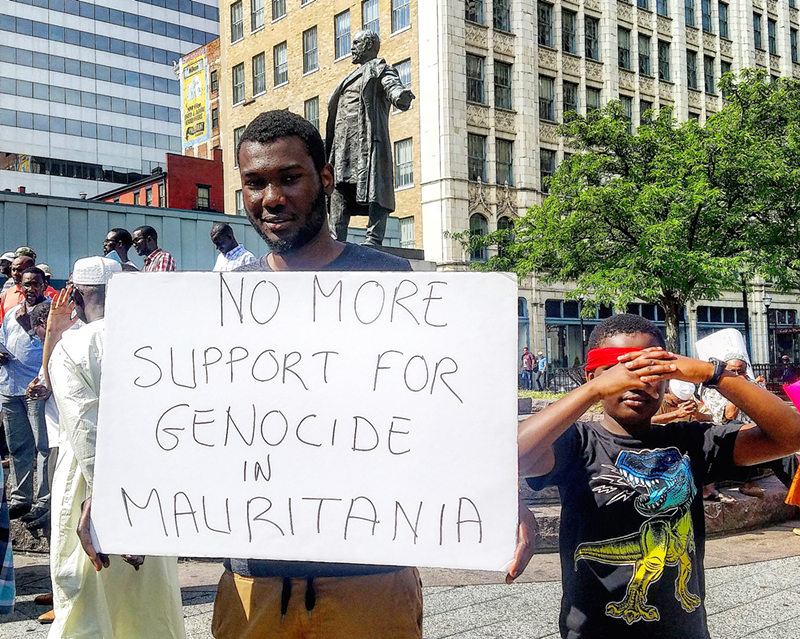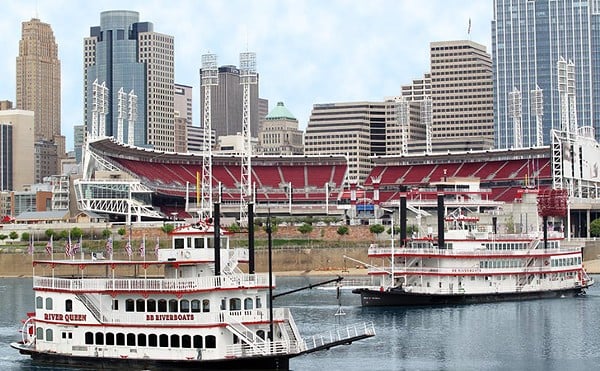More than 100 people living in Greater Cincinnati who came here from the West African nation of Mauritania rallied downtown today asking the United States to sanction the government of their home country.
The rally, organized by members of the Greater Cincinnati Mauritanian community, was meant to raise awareness about conditions in the country of roughly 4.5 million people. The event started at Piatt Park downtown and included a march to the National Underground Railroad Freedom Center. The march then looped back to Piatt, where a large group chanted, "What do want? Justice. Where? Mauritania."
Some members of the group also met with U.S. Rep. Steve Chabot, a Republican who represents the western half of Cincinnati as well as Warren County.
Abdoulaye Sow, a local Mauritanian-American activist, says that meeting went well and that the group hopes for a resolution in the U.S. House of Representatives condemning the actions taken by the Mauritanian government. Sow and other activists would also like to see the U.S. impose sanctions on the country.
The Trump administration last year curtailed the country’s trade relationship with the U.S. over continuing slavery there, a move Sow and other activists have applauded. And the U.S. Department of State has acknowledged the continued existence of slavery and other human rights abuses.
Despite this, however, the Trump administration has also continued providing millions in funding to Mauritania for counterterrorism efforts. It has also moved to deport Mauritanians here in the U.S. back to their home country, including some here in Greater Cincinnati. Those are both issues local activists have been pushing against.
Cincinnati and Columbus and their outlying suburbs have the largest concentrations of Mauritanians living in the U.S. — at least 6,000 people. Many came over the past three decades to escape the country's oppressive conditions for its black residents, who have often been enslaved or stripped of citizenship by a light-skinned ruling minority.
Mauritania gained independence from France in 1960, when a small group of Arabic-speaking elites took the reigns. The ruling group continually oppressed the country's black population, according to human rights groups. One of the most dramatic examples stemmed from a conflict between the country and neighboring Senegal. During that incident, the Mauritanian government undertook a massive round of deportations and alleged killings between 1989 and 1992. Thousands were displaced from the country and an unknown number were killed.
Slavery was not criminalized in Mauritania until 2007, and the practice still persists today, according to the United Nations, which estimates between 10 to 20 percent of Mauritania's population is enslaved. More recently, the government has made moves to strip thousands of black Mauritanians of their citizenship, human rights advocates say.
Now, the government is taking repressive actions after protests over the country's June 22 elections, some local Mauritanian leaders say. The ruling party's candidate, Mohamed Ould Ghazouani, declared himself winner of the presidential election hours after the polls closed. The next day, internet access in some parts of the country was suspended and a number of prominent leaders opposed to the ruling party were arrested.
Amnesty International and other human rights organizations have protested the government's actions. Other candidates in the election have filed an appeal to challenge the election results.
Ghazouani's rise to power comes after two terms by Mohamed Ould Abdel Aziz, who became the country's leader following a 2008 coup. Aziz stepped aside due to term limits. It's the first peaceful handoff of power the coup-plagued country has seen in decades.
Despite the new leader, local activists say the country is still very repressive. They're calling for local attention to the issue.
"From apartheid to de-naturalization of Black citizens, ethnic cleansing and slavery, the ruling junta operates with impunity as an international human rights outlaw," Mauritanian-American activist Saidou Wane wrote in a news release about the march. "Cincinnati is home to thousands of native Mauritanians forced to flee the repression, torture and systemic brutality of this and former regimes."






